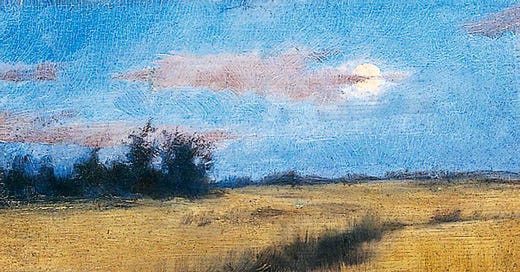From now on, I’m planning to share responses to the monthly email as a unique post. I don’t want them to get lost at the bottom of each month’s newsletter (and this way, you have the opportunity to comment and share your thoughts, as well). Will plan to send them out closer to the middle of the month going forward.
Hope you all enjoy the last couple days of August!
— Gracy
“Our neighborhood is nearly built out, a few more lots to go, and I’ve noticed that the long, wide parking median along the street that includes the entrance to our ‘hood was looking rather shabby with weeds, trash, a couple dead squirrels (ugh) etc. Since we don’t have an HOA with any fees for upkeep of common areas, it simply falls to the homeowners to care for it.
“We’re retired, and have a xeriscape yard that requires very little effort, so I have time and energy to lean into projects like this. I just grab a couple of large buckets, my knee pads and a hori hori tool, then start digging (and bagging the squirrel carcasses). Still have some work to do to complete the first pass, then will maintain it thereafter. I’ve met many neighbors during this endeavor who thank me, and a few also pitch in.
I think it’s vital for the health of our community and relationships with our neighbors that we do what needs to be done, without expecting credit or compensation. I like to serve with humility, spreading joy and kindness, shining the light of our Lord all along the way, which answers another one of your questions... to me, living like a perennial is a demeanor we can bring with us anywhere throughout our lives.”
— Steve
“Thinking about whether ‘living like a perennial’ requires staying in the same place, or is a demeanor we can bring with us as we journey through life... well, I don't want to discount the second possibility... But oh boy, living in one place for a long time helps so much! In these times of high-mobility lives, we've underestimated the value of reputation.
“I become more able to help others if a new acquaintance can quickly discover that someone else thinks I'm sane, kind, and capable. And I also become more able to help neighbors effectively as I grow in my understanding of the community—norms, patterns of thought and speech—and also the pairwise network of relationships between individuals and families. So many interactions that would conceal things from an outsider will reveal people's meanings/needs/situations to a long-timer. (Have you heard of Dunbar's number?) I guess my main thought is that the same amount of virtue... ‘buys’ you more ability to bless others if you've lived in a given place for more years. … If you are new, you don't know what you don't know!”
— Vikki
“The lesson from your mom about leaving a place better than you found it reminded me of one of the bits of ‘settled law’ from the podcast Judge John Hodgman: ‘Be mindful of the work you leave for others.’ This also rings true as a homeowner. We renovated our house's original 1956 kitchen last year, and all I could think was, You're welcome, future homeowners. It's something we can enjoy now, but it's also work they won't have to do.”
— Chad
“Leaving a place, or leaving anything behind better than it was and not just taking for the sake of taking—or even worse, to keep others from enjoying it—is a special privilege. To be able to be at peace with oneself and one’s lot in life so that you feel free to give back to the universe and to the unknown stranger is a privilege not everyone gets to experience. I’ve been there, and know many people who are stuck in cycles of bitterness or resentment over what they have lost, or what they perceived they have lost. To get free of this is a blessing.”
— Danny
“It’s time to build that community we keep talking about. We can start by talking with people on the Metro instead of staring at our phones. We can continue by having dinner with people we disagree with. Maybe we can’t start a garden in our apartment complex, but we can find a local farmers’ market and get to know the man who sells us peaches—actually get to know him, beyond a simple greeting. We can build up our apartments as if they are real homes, places of hospitality and warmth, rather than just a place to crash at the end of a workday. Planting seeds of permanence means being uncomfortable, at first, spending time with different people in different places when it’d be easier to go home on the weekend.”
— Carmel Richardson, responding to “Living Like Perennials” in The American Conservative



